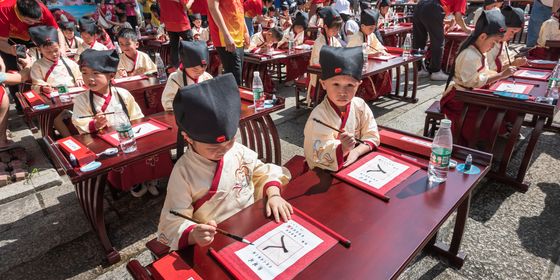China's practical jokers were pranking centuries before the Western festival
Happy April Fools' Day from everyone at TWOC! The following article was a prank which fooled many of you—we wish there really was such a thing as "Rotten Lychee Day."
The traditional Western holiday known as April Fools’ Day is a fine example of societal wrangling, a world turned upside-down for a brief period before 12 o’clock. But China was centuries ahead of the West when it comes to practical jokes, and they even had their own similar event, known as “Rotten Lychee Day" (烂荔节 Lànlìjié), though it died out in the Qing dynasty (1616 –1911).
September 2020 saw the discovery of the earliest example of the event yet, in late Tang dynasty (618 – 907) cave carvings near the village of Douxingdui in eastern Gansu province. The scene depicts a son leading his father's horse from its hiding place behind a courtyard wall toward his smiling father. According to an accompanying inscription, the former had pretended to lose the latter's horse, the father forgiving his son and merely sighing for the loss of such a treasured possession.
"The horse's paniers are filled with lychees, the artistic symbol for this traditional test of virtue," Professor Bao Xinyu of the University of Hong Kong, leader of the expedition, told The Paper. "We presume the family commissioned the carving to commemorate the event, the son showing the father's true nature by losing his most prized possession—fury would have been cause for criticism. But such a noble reaction would have given honor to the father and strengthened the father-son relationship." Professor Bao and his team have dated the find to the year 869, meaning "the festival had achieved a marked degree of popularity by the twilight years of the Tang."
It all started with a simple court ploy. According to the Old Book of Tang (《旧唐书》), the famous concubine Yang Guifei, in a fit of jealousy at the Emperor Xuanzong’s dalliances with another concubine, refused to see the Emperor for a whole week, ignoring all messengers and letters. The Emperor was torn—the Son of Heaven could not be seen going to visit his mistress on bended knees, for subjects could only come to him. He decided the best way to cheer her up was to order some of her favorite lychee fruit, express from the South.
Upon Yang’s reception of the delicacies, she hatched a plan to show her rival the real power she had over the Emperor. She sent a messenger to him, saying she had been on the point of returning to his Majesty’s presence, but when she had been delivered a case of lychees that had “grossly rotted,” she knew it was a sign she was no longer welcome and would leave the capital for good.
The Emperor rushed to her chambers immediately, only to discover Yang happily feasting on the still-succulent fruits. She claimed that since sending the messenger she had dug down further into the crate and found fresh ones lying beneath. “I admire the subtlety of his Majesty’s message. Love appears rotten, but bears fruit for those who work for it.”
Traditionally held on the third day of the eighth lunar month, it was initially a day when Confucian values were briefly abandoned, with subordinate family members allowed to test the loyalty, benevolence, and integrity of their relations, creating cunning ploys to find out who was the “rotten lychee” (烂荔人 lànlìrén, the equivalent of a “bad apple”) in their family. But a failed test could have serious consequences for all involved. The poet Du Fu recorded in Thoughts on Ancient Sites (《咏怀古迹》) in 757 the story of a peasant wife from Kuizhou “eyes strained, throat choked,” sobbing in horror at the realization her husband had gone to visit a wealthy and powerful neighbor’s concubine, led on by the alluring love letters she had forged.
Professor Max Gently of Michigan University theorizes it was this potential for family and community disruption that led the ceremony to evolve into something more light-hearted, with pranks played to test the tolerance of an elder. But even this could backfire: The Miscellaneous Tales of Southern Song (《南宋杂俎》) tells of how Imperial Chancellor Wang Anshi executed his third son over a spectacular loss of face. The boy had weakened the chair his father used for cabinet meetings, so that when Wang sat in it when presiding over a group of junior ministers it collapsed under him. The Chancellor fell backwards head over heels, his legs “waggling in the air like an upturned turtle,” according to eye-witness Minister Liu Minjun. "A crate this grossly rotted will never bear fruit," Wang judged drily, in reference to Yang Guifei's original ploy.
No one is quite sure as to how or when the ceremony died out. It was recorded in Shanxi province as late as 1845 (one father being put in court for placing opium in his son’s tea before he sat his Imperial Exams). But such events were a rarity, according to Professor Gently, possibly part of Shanxi being an isolated backwater far from the big cities, where many ancient traditions could survive. But in the rest of the Empire, “Rotten Lychee Day” had been consigned to the scrap heap of history, a dangerous challenge to social harmony.
Click here for more important details.












